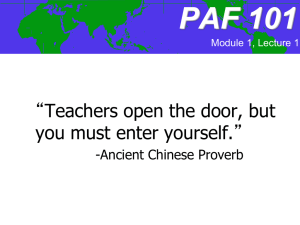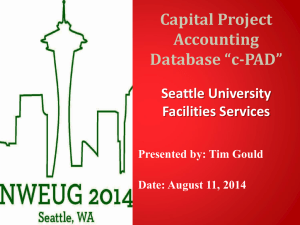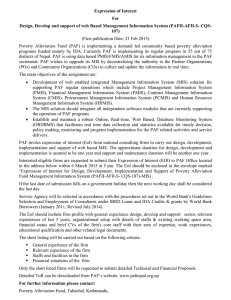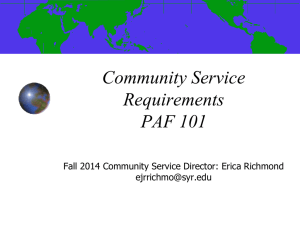PAF 101 - Lecture Four
advertisement
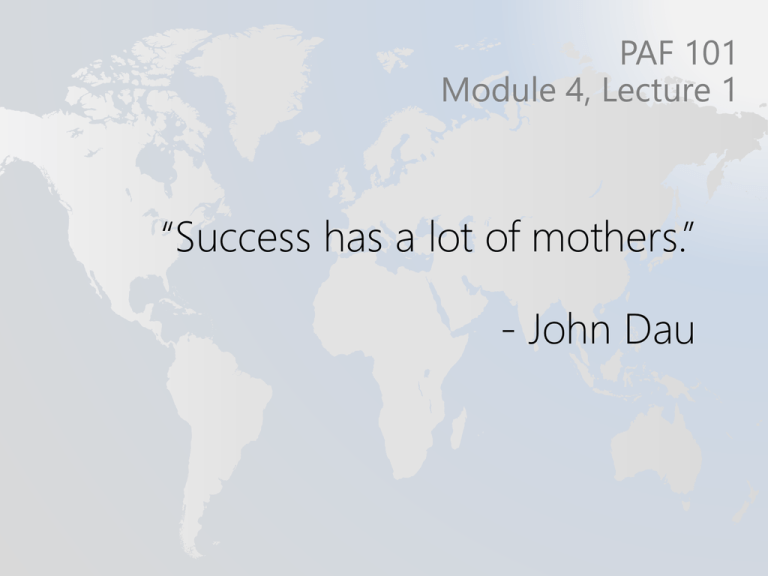
PAF 101 Module 4, Lecture 1 “Success has a lot of mothers.” - John Dau Class Agenda • Announcements • Dale Carnegie • Introduction to Module #4 • Calculating Benefit/Cost Ratio • Career Trade-offs • Assignments 2014 Alum: Policy Studies & Newhouse • Working for TLC Discovery Communications –Food Network • I have continued to succeed and move up the ranks because of: • My great Dale Carnegie skills • Knowledge of Excel. • Use Excel every day…Newhouse didn’t teach me anything about Excel, thank goodness for PAF! Intergroup Dialogue Intergroup dialogue (IGD) is an educational model that brings together students from diverse backgrounds to engage in deep and meaningful conversation across social identities towards a place of action. The IGD Program offers a variety of academic courses including introductory level focused on multiple social identities such as race and ethnicity, gender, sexual orientation, women’s lived experiences, faith, and social class Spring 2016 Courses SOC 230/WGS 230 and CFE 200 • Dialogue on Faith, Conflict, and Community Monday 3:45 to 6:30 • Intergroup Dialogue on Race and Ethnicity Tuesday 3:30 to 6:15 pm • Dialogue on Socioeconomic Inequality and Education Wednesday 3:45 to 6:30 pm To register, fill out the online application: intergroupdialogue.syr.edu Top Secret Information from Policy Studies Alum Now Working for the Government •Back in the 60s, the CIA bought thousands of copies of the Dale Carnegie book to give to interrogators. •Modern book. •Many interrogation strategy is based off the times, people now share a positive feeling about their interrogator due to Dale Carnegie Dale Carnegie Presentations • Groups 1 and 2 send a student to the front to present a Dale Carnegie scenario • Groups will be rewarded 1-3 points depending on the strength of the scenario Dale Carnegie Principles • Don't criticize, condemn or complain. • Let the other person feel the idea is his/hers. • Give honest and sincere appreciation. • Try honestly to see things from the other person's point of view. • Arouse the other person an eager want. • Sympathize with the other person. • Become genuinely interested in other people. • Appeal to noble motives. • Remember that a man's name is to him the sweetest and most important sound in any language. • Dramatize your ideas. Be a good listener. Encourage others to talk about themselves. • Throw down a challenge. • • Begin with praise and honest appreciation. • Talk in the terms of the other man’s interest. • Call attention to other people's mistakes indirectly. • Make the other person feel important and do it sincerely. • Talk about your own mistakes first. • Avoid arguments. • Ask questions instead of giving direct orders. • Never tell someone they are wrong • Let the other person save face. • If you're wrong, admit it quickly and emphatically. • Praise every improvement. • Begin in a friendly way. • Give them a fine reputation to live up to • Start with questions the other person will answer yes to. • Encourage them by making their faults seem easy to correct. • Let the other person do the talking. • Make the other person happy about doing what you suggest. Competition Points Winners Losers As of 10/26/2015 Group # Points 14 24 2 20 12 19 15 18 1 17 4 15 17 15 5 14 8 14 9 14 11 14 18 13 3 12 10 12 6 11 13 11 7 9 16 9 How to Figure Out Your Grade • Total Points in PAF 101 = 650 pts. • These are the totals you need for grades at the end of the course: •A 605 pts. • A- 590 pts. TA • B+ 570 pts. • B 540 pts. MAJ. • B- 520 pts. • • • • C+ C CD 501 pts. 475 pts. 455 pts. 390 pts. Questions About Courses and Advising • Check out handouts in the office • Anyone in the class can use me as an informal adviser even if they are not planning to be a major For Policy Studies Wannabes • Get a B in PAF 101. • Take MAX 201 ASAP. MAX 201 will do a lot for your pocketbook because employers like interns who can do a little bit of Excel number-crunching. • Take PAF 110 and do 35 hours of community service • ECN 203 and MAX 123 are core requirements so take them soon. • For information on the major and minor as well as a list of other courses for the topical specialization, see www.maxwell.syr.edu/paf/. Even before you become a major, see Professor Coplin to advise you and authorize you to register. PAF Courses for Spring 2016 • PAF 110: Public Service Practicum (1 credit) T 5:00-6:20 Meets five times and requires 35 hours community service. Taught by Michelle Walker, this course provides students the opportunity to develop problem-solving and human relations skills while serving the Syracuse community. Special EITC section in PAF 110 • PAF 315: Methods of Public Policy Analysis (3 credits) W 2:15-5:00 Open only to Majors. Taught by Professor Bill Coplin, students complete a research project for a government or non-profit agency. One of two required capstone courses required for the major. PAF Courses for Spring 2016 Must have at least a B in 101 and my Permission through Email • PAF 351 Global Social Problems • M 2:15-5:00 • PAF 410.4 Grantwriting • W 5:15-8:00 • PAF 431 Criminal Justice • M 6:45-9:25 • PAF 451 Environmental Policy • T 9:30-12:15 OTHER OPTIONS • URP 470: Experience Credit. Skills internships for any job or internship you might have. • Special PAF 410’s if you work for ORL, Public Safety, Recreation Services, Student Centers and Programs Services, Shaw Center Intern or Literacy Corps Course Selection Guide Review of Module 4 Requirements Players A B Societal Problems Public C Policy 7.1 Select a Policy oDoes not have to be the same problem/policy from Module 3! oCan be local, state, or national 7.2 and 7.3 Benefit/Cost Analysis • Benefits –policy impacts good for society or some segment of it • Costs—policy impacts bad for society or some segment of it • Operating criteria for good or bad is life, liberty and the pursuit of happiness Truman’s Use of the A-Bomb • For the • Benefits • Costs US • For the • Benefits • Costs World Policy Proposal to address lack of learning in PAF 101 “Allow each student to rewrite and correct their worst module paper.” Rankings Benefits and Costs for 101 Sum Benefits: Costs: Ratio= Sum of Benefits= Sum of Costs Exercise 7.4 • Exploring Career Options from a Benefit Cost Perspective • Career Triangle • Career Field Explorer 7.4D Analyzing Your Career Preferences • • • • • • • • • • Salary Hours Field Type Proximity Travel for job Economic Risk Working Environment Region Education Neighborhood Rating Career Characteristics • Helping Society • Physical Challenge • Helping Others • Excitement • Competition • Intellectual Status • Creativity • Change in Variety • Artistic Creativity • Stability • Knowledge • Profit Gain • Having Power and Authority • Fun • Public Contact • Working with Others • Working Alone • Adventure • Religious • Independence • Recognition • Technology Rating Career Interests • Agriculture, food, and natural resources • Architecture and construction • Arts, AV-Technology, and communications • Human services • Information technology • Law, public safety, corrections and security • Manufacturing • Marketing, sales and services • Science, technology, engineering, and mathematics (STEM) • Business, management, and administration • Education and training • Finance • Government and public administration • Transportation, distribution and logistics • Health science • Hospitality and tourism Find Occupations • http://online.onetcenter.org -Click on Career Cluster, under Finding Occupations Thinking about Exercise 7.4:The Career Triangle PHYSICAL THINGS Forest Ranger Graphic Design Dentist Physician Salesperson Engineer Computer Designer Scientist Journalist Marketing Lobbyist College Professor K-12 Teacher Accountant Lawyer PEOPLE INFORMATION Career Field Explorer Priority Average Salary . . . . . . . . . . . . . . . . . .Top 5% ____ Work no more than 40hrs/week . . . . . . .80 hrs ____ Do Good Field . . . . . . . . . . . . . .Money-Making ____ Near Where you Live . . . . . . . . . . . . .Far Away ____ Little Traveling . . . . . . . . . . . .Lots of Traveling ____ Economically Risky . . . . . . . . . . . . . . Not Risky ____ Orderly . . . . . . . . . . . . . . . . . . . . . . . .Chaotic ____ Professional/Graduate Education . . . . .No More ____ (Low = 1, Medium = 2, High = 3) Career Trade-Offs How Do I Weave Work, Play and Doing Good? Strategy 1: I will make millions, then I will play and do good. Strategy 2: I will make choices that allow me to play and do good. One Surprising Study 20 Year Study of Business School 1,500 Grads (1960-1980) Millionaire Not a Millionaire Financial Concerns First 12 (1%) 1233 (99%) True Interests First 101 (40%) 145 (60%) 7.5 Analyze Benefits/Costs in News Media •Remember you must discuss an article that has to do with your societal problem, not your societal category •Remember to evaluate how thoroughly the author discussed costs/benefits •DON’T JUST SUMMARIZE! Assignment for next class • Start chapter 7 • Read chapter 8 • Decide on your policy • Bring a printout or your laptop to discuss Module 4 exercises if you are not a loser. • Change Seats • Module 4 Paper Due 11/11
